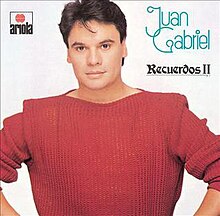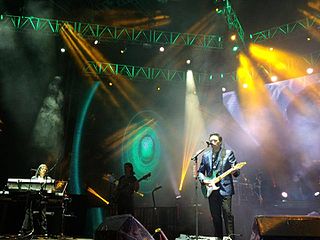
Los Temerarios are a Mexican grupero band from Fresnillo, Zacatecas, started in 1977 by brothers Adolfo Ángel and Gustavo Ángel and their cousin Fernando Ángel. During their early years, they were known as Conjunto La Brisa.

Rubén Blades Bellido de Luna, known professionally as Rubén Blades, is a Panamanian musician, singer, composer, actor, activist, and politician, performing musically most often in the salsa, and Latin jazz genres. As a songwriter, Blades brought the lyrical sophistication of Central American nueva canción and Cuban nueva trova as well as experimental tempos and politically inspired Son Cubano salsa to his music, creating "thinking persons' (salsa) dance music". Blades has written dozens of hit songs, including "Pedro Navaja" and "El Cantante". He has won twelve Grammy Awards out of 20 nominations and eleven Latin Grammy Awards.

Alberto Aguilera Valadez, known professionally as Juan Gabriel, was a Mexican singer-songwriter and actor. Colloquially nicknamed Juanga and El Divo de Juárez, Juan Gabriel was known for his flamboyant style, which broke norms and standards within the Latin music industry. Widely regarded as one of the best and most prolific Mexican composers and singers of all time, he is regarded as a pop icon.

Cristian Sáinz Castro is a Mexican pop singer. He is the son of actors Verónica Castro and Manuel "El Loco" Valdés, and nephew of actors Ramón Valdés and Germán "Tin-Tan" Valdés. Castro has sold over 12 million copies, making him one of the best-selling Latin music artists of all-time.
The Grammy Award for Best Mexican/Mexican-American Album was an award presented to recording artists for quality albums in the Mexican music genre at the Grammy Awards, a ceremony that was established in 1958 and originally called the Gramophone Awards. Honors in several categories are presented at the ceremony annually by the National Academy of Recording Arts and Sciences of the United States to "honor artistic achievement, technical proficiency and overall excellence in the recording industry, without regard to album sales or chart position".

María Guadalupe Araujo Yong, better known as Ana Gabriel, is a Mexican singer and songwriter. During her long career, she has performed different genres of music and has received several accolades. As a result, she has been called La Diva de América and La Luna de América.

María de los Ángeles de las Heras Ortiz, better known as Rocío Dúrcal, was a Spanish singer and actress with a career spanning more than four decades. She performed pop music, bolero, mariachi and romantic ballads and is widely regarded as one of the greatest Spanish singers of all time. Popular across Mexico and Latin America, she earned the sobriquet of Reina de las Rancheras.
Mexican pop is a music genre produced in Mexico, particularly intended for teenagers and young adults.
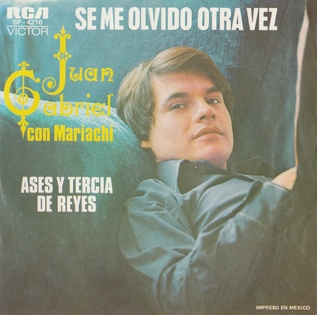
"Se Me Olvidó Otra Vez" is a song written and performed by Mexican singer-songwriter Juan Gabriel for his fourth studio album, Juan Gabriel con el Mariachi Vargas de Tecalitlán (1974). The song is a ranchera number that tells of an awaited but impossible reunion as the singer forgets he is the only one who loved the woman. It was released as the lead single from the album in 1975. The song has been listed as among Juan Gabriel's best songs according to music critics and was one of the best-performing singles of 1975 in Mexico. Gabriel has re-recorded the song twice, the first for his compilation album, Por Los Siglos (2001), and as a duet with fellow Mexican singer-songwriter Marco Antonio Solís on his 28th studio album, Los Dúo (2015).
Pandora are a female Mexican singing group formed in 1981 under the name Trebol by sisters Isabel Lascurain and Mayte Lascurain and their cousin Fernanda Meade. The group was renamed "Pandora" upon signing with EMI Records in 1984.
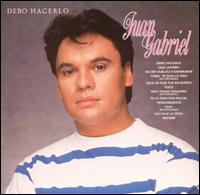
Debo Hacerlo is a compilation album by the Mexican singer-songwriter Juan Gabriel. It was released in 1988, and would be the last album with new songs released by the singer, until his album Gracias Por Esperar in 1994. The title song became the second number-one single for Gabriel in the Billboard Hot Latin Tracks chart and the album sold seven million copies worldwide, his second best selling album after Recuerdos II.
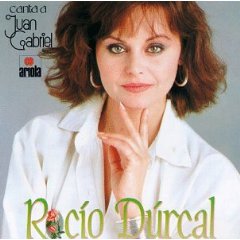
Canta A Juan Gabriel Volumen 6 is an album by Spanish singer and actress Rocío Dúrcal, which was released in 1984. The songs in the album were written by Mexican singer/songwriter Juan Gabriel who also appeared on the album. Déjame Vivir is one of her biggest hits and the video was a huge hit as well with special guest Juan Gabriel. The album was nominated for a Grammy Award for Best Mexican-American Performance. The album inducted into the Latin Grammy Hall of Fame in 2013.

Inocente de Ti is the 26th studio album recorded by Mexican singer-songwriter Juan Gabriel. It was released by BMG U.S. Latin Latin on October 21, 2003. It was also the theme song for a Mexican telenovela Inocente de Tí (2004-2005), produced by Nathalie Lartilleux, Camila Sodi and Valentino Lanús, starred as protagonists, while Helena Rojo and Carolina Tejera starred as antagonists. Lupita Ferrer and Ricardo Blume starred as stellar performances. The song Yo Te Recuerdo was used as the theme song of the telenovela Mariana de la Noche (2003-2004), produced by Salvador Mejía, but with a different musical arrangement. Alejandra Barros and Jorge Salinas starred as protagonists, while César Évora and Angélica Rivera, starred as antagonists. The album received a nomination Latin Grammy Award for Best Singer-Songwriter Album in 5th Annual Latin Grammy Awards, losing yo Soraya by Soraya.
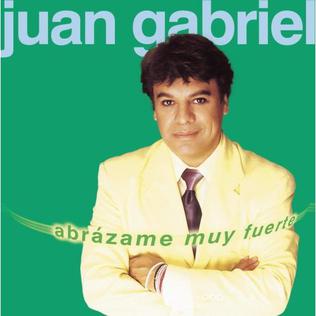
Abrázame Muy Fuerte is the twenty-fifth studio album by Mexican singer-songwriter Juan Gabriel, released by BMG U.S. Latin on December 12, 2000. The title track is the theme song for the Mexican telenovela Abrázame Muy Fuerte (2000–2001), produced by Salvador Mejía Alejandre, Victoria Ruffo, Fernando Colunga and Aracely Arámbula starred as the protagonists, while César Évora, Nailea Norvind, Helena Rojo and Rossana San Juan, portrayed the antagonists. In 2002, the album was awarded at the Premio Lo Nuestro for Pop Album of the Year and was nominated for a Grammy Award for Best Latin Pop Album in the 44th Annual Grammy Awards.
"Hasta Que Te Conocí" is a song by Mexican singer-songwriter Juan Gabriel. It was released in 1986 as the third single from his studio album Pensamientos. Written and produced by Gabriel, the song's lyrics focus on a protagonist learning the meaning of suffering after meeting a lover who mistreats him. It peaked at number two on the Billboard Hot Latin Song chart. A live version of the song was included on his album En el Palacio de Bellas Artes (1990) which peaked at number ten on the Hot Latin Songs chart.
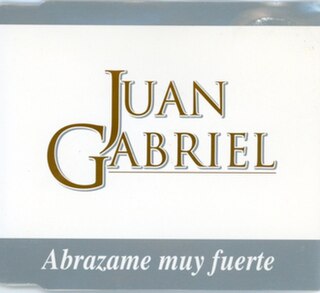
"Abrázame Muy Fuerte" is a song written and performed by Mexican singer-songwriter Juan Gabriel. The song was produced by Bebu Silvetti and was composed for the Mexican telenovela of the same name (2000). It was released as the lead single on June 2000 for the compilation album El Alma de Divo (2000) and later included on his 25th studio also titled Abrázame Muy Fuerte (2000). A romantic ballad with Latin and pop sounds and backed by an orchestra, it is a confession of love. Gabriel was inspired to write the song due to his sister's coma.

Todo (Everything) is the eighteenth studio album by Juan Gabriel, released in 1983. Todo received a nomination for a Grammy Award for Best Mexican/Mexican-American Album.
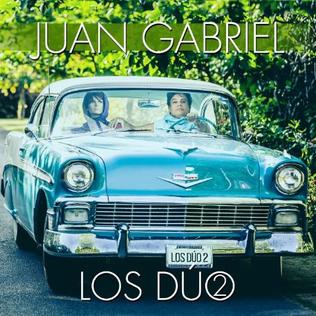
Los Dúo, Vol. 2 is the twenty-ninth studio album by Mexicanmusician Juan Gabriel, released on December 11, 2015. It features artists performing duets with Juan Gabriel. The album won Album of the Year and Best Traditional Pop Vocal Album at the 17th Annual Latin Grammy Awards.

The following is the discography of Mexican singer Juan Gabriel. Dubbed the "King of Latin Pop", he has sold over 100 million records worldwide, making him the best-selling Mexican artist of all time.
This article includes an overview of the major events and trends in Latin music in the 1980s, namely in Ibero-America. This includes recordings, festivals, award ceremonies, births and deaths of Latin music artists, and the rise and fall of various subgenres in Latin music from 1980 to 1989.
